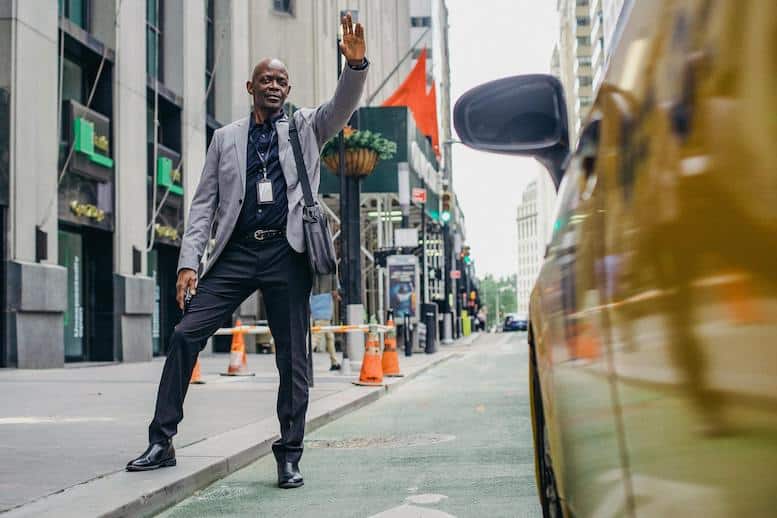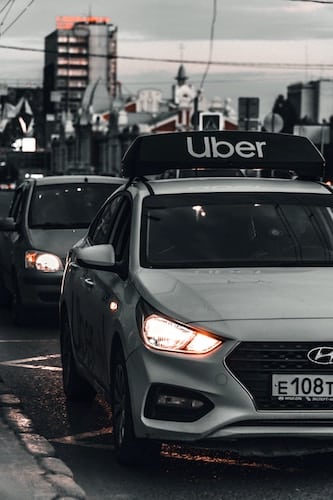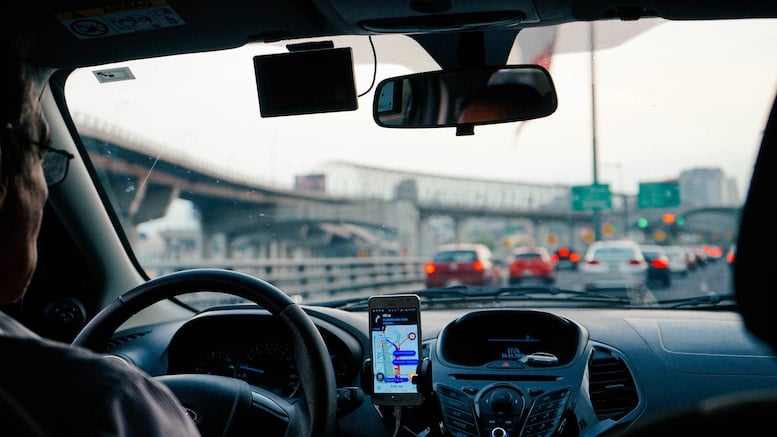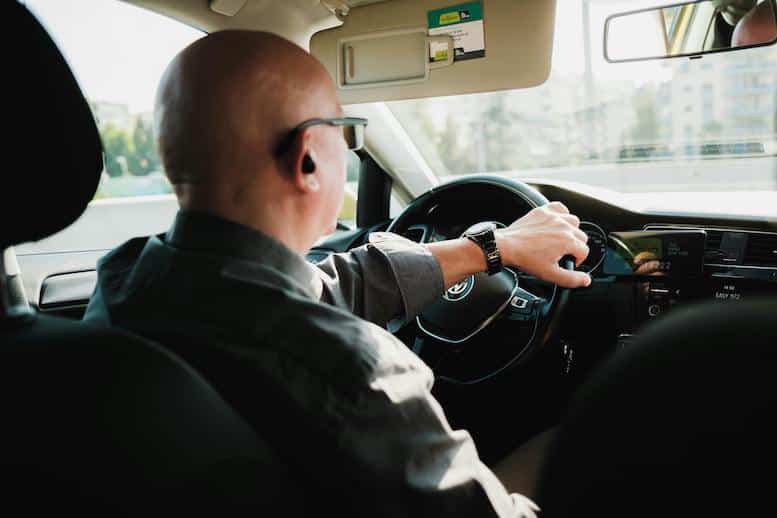Did an Uber or a Lyft Driver Cause Your Auto Accident?
Written by Funk & Associates Personal Injury Lawyers
We all know Austin traffic is terrible. But in some respects, getting around town has become a lot more convenient over the years.
In 2024, you can use your mobile phone to order a car whenever you need a ride. With just the touch of your finger, you’re on your way to Sixth Street, Austin-Bergstrom airport, or wherever else you need to be.
But what happens if the driver behind the wheel causes an injury auto accident?
In that case, you might have to file a legal claim against Uber or Lyft (or one of the smaller rideshare companies operating in Austin, such as Wridz or Wingz).
While these ridesharing services are innovative and convenient, their drivers sometimes slip through the cracks of insurance coverage after an accident.
The best way to protect yourself after an accident involving a rideshare driver with poor or difficult insurance companies is to hire an Austin Uber/Lyft rideshare accident lawyer at Funk and Associates.
Let’s look at how we can help you …

Common Causes of Ridesharing Accidents
In recent years, there have been many ridesharing accidents in Austin causing injuries or deaths. Auto accidents involving rideshares are happening more often because they’re becoming more popular and because our traffic problems are getting worse.
The National Highway Traffic Safety Administration (NHTSA) is warning both riders and drivers about the dangers of these accidents.
Here are some common reasons for these accidents:
- Distraction: Distraction is a serious issue for both drivers and pedestrians. Ridesharing drivers often use their iPhone or Android GPS systems, making them more likely to engage in unsafe driving behaviors. Touchscreen displays in the car can be a solution to find a passenger’s destination without using phones, but most drivers don’t have them.
- Speeding: Speeding is a big problem in Austin, especially for ridesharing drivers who are in a hurry to pick up their next passenger. According to NHTSA, over 9,000 deaths happen each year due to speeding. Ridesharing drivers were found to speed in about 30 percent of their journeys.
- Drunk Driving: Driving under the influence of alcohol is dangerous. It impairs a driver’s ability to think and make the right decisions, increasing the risk of a crash. Passengers can’t check if an Uber driver is drunk before getting in the car, but be sure to do a quick “vibe check” when you start the trip. If the driver seems impaired in any way, end the ride and call someone else. But (of course), if you’re the other driver (in a car hit by an Uber driver), you’ll have no way to prevent the accident, other than driving defensively.
- Reckless Driving: To make more money, rideshare drivers may drive recklessly. This includes speeding, running red lights, making illegal turns, and weaving through traffic. These behaviors contribute to over 1,000 deaths and many injuries each year.
- Inexperience: Ridesharing can be risky if inexperienced drivers transport passengers. Many companies only require drivers to have a minimum of three years of experience and offer little to no training. Passengers can protect themselves by choosing experienced drivers with positive feedback. But again, if you’re the driver of a car hit by a rideshare, you can’t do anything about the inexperience of other drivers. So drive defensively!
The Challenge with Ridesharing Services and Insurance
Rideshare employees have both a personal and a company policy that applies to accidents in which the driver is at fault.
If the Uber or Lyft app is not on at the time of the accident (for example, the driver was driving for their own purposes), a claim can only be filed against the driver’s personal insurance. In other words, he or she was not “on the job”.
Things are different if the Uber or Lyft app is turned on at the time of the accident.
If the driver was marked as “available” and was waiting to pick up passengers, claims can be made against both the driver’s personal auto insurance and Uber or Lyft’s contingent liability coverage. The latter includes up to $50,000 to $100,000 for injuries and $25,000 for property damage.
If the driver is transporting passengers, the commercial insurance coverage for Uber or Lyft applies. This includes coverage for up to $1 million in third-party liability and $1 million in uninsured or underinsured motorist coverage.
Here are some key points regarding insurance coverage:
- Limited Coverage in Accidents: If a hired driver who is not carrying passengers causes an injury auto accident, the company’s liability insurance may not apply. The responsibility falls on the driver’s insurance to cover repairs exceeding the value of their car if they are uninsured.
- Personal Insurance Challenges: Most personal auto insurance policies don’t cover rideshare drivers using their vehicle for commercial purposes without prior disclosure. Commercial insurance is recommended to protect income and vehicles from property loss.
- Liability for Injuries and Accidents: With the increasing popularity of rideshare services, determining liability for accidents and damages caused by Uber and Lyft in Austin, Texas, is not always clear. The independent contractor status adds complexity to the question of who is responsible.
Rideshare drivers may need commercial insurance to ensure proper coverage. Otherwise, the independent contractor status and limited insurance coverage may not cover all claims related to the accident. Many drivers have minimal coverage, leaving victims with inadequate compensation for medical expenses, lost wages, and other types of damage.
Uber and Lyft claim to be platforms connecting people with ridesharing services, avoiding responsibility for driver actions. But accident victims are increasingly holding the rideshare companies accountable.
The reality is that Uber and Lyft operate in the transportation industry and should be held responsible for the safety of both passengers and drivers in their network.
If you’ve been in a rideshare accident, experienced personal injury attorneys, like those at Funk and Associates, can help you pursue compensation. You may be able to file a lawsuit against the Uber or Lyft driver by proving their fault in causing your injuries. Seeking legal assistance is crucial in navigating the complexities of rideshare accidents and holding the responsible parties accountable.
Common Injuries We See In Austin’s Ridesharing Accidents
Here are some common injuries that ridesharing accident victims may experience:
- Concussions: Concussions can occur from any impact to the head or body, not just a direct hit to the head. Symptoms include dizziness, headaches, nausea, vomiting, confusion, and memory loss.
- Neck and Back Injuries: Whiplash is a common injury in ridesharing accidents, causing pain and suffering. Although not life-threatening, seeking medical attention is crucial if you experience neck or back pain after an accident. Back injuries can include herniations, bulging discs, extrusions, and fractures. Many back injuries require surgical intervention and years of physical therapy. Of course, all these injuries greatly affect your quality of life, emotional state, and ability to earn a living.
- Broken Bones: Broken bones can take weeks or months to heal. If you suffer a broken bone in an accident, seeking immediate medical attention is essential for proper treatment.
Other injuries that can occur in ridesharing accidents include:
- Traumatic Brain Injuries
- Soft Tissue Injuries
- Fractures
- Spinal Injuries
It’s important to seek medical help promptly if you’ve been involved in a ridesharing accident—even if you think your symptoms aren’t bad. Time is of the essence in personal injury lawsuits, so DO NOT WAIT, get medical treatment and call us promptly!
Ridesharing Accident Victims May Be Entitled To Several Types of Damages
If you get hurt in a ridesharing accident, you might be eligible for compensation. Here are five types of compensatory damages you could be entitled to:
- Punitive Damages: These are awarded to punish the negligent party and discourage similar accidents. If you’re injured in a ridesharing accident, consult an experienced attorney to understand the full scope of damages available to you.
- Medical Expenses: The cost of medical treatment can be high after a ridesharing accident. You can seek compensation for expenses like hospital bills, doctor’s visits, and physical therapy.
- Lost Wages: If the accident prevents you from working, you may recover lost wages. This is based on the idea that, without the accident, you would have been able to work and earn income.
- Pain and Suffering: After a ridesharing accident, you may be entitled to damages for the physical and emotional distress you’ve experienced. Proving this requires showing significant problems and difficulties in resuming your normal life. An experienced Uber and Lyft accident lawyer can assist in building your case.
- Emotional Distress: Beyond monetary damages, you might recover damages for emotional distress, including symptoms like anxiety, depression, nightmares, and trouble sleeping. Severe cases could even qualify as post-traumatic stress disorder (PTSD). Discuss these symptoms with your attorney to explore compensation for the impact on your mental health.
Let Funk Fight For You
If a rideshare driver caused your accident, you deserve to recover compensation for all your losses. Period.
But it’s easier said than done. The process is challenging to navigate, so you must work with experienced rideshare accident lawyers who have a proven track record of helping injured passengers get the money they deserve.
Injuries can last a lifetime. But with the help of a good personal injury lawyer, you can get the care and compensation you need to recover.
If you or a loved one was injured in a car accident involving a rideshare vehicle, you deserve full compensation that would cover your medical costs and other expenses. The Uber and Lyft accident lawyers at Funk and Associates have the skills to ensure that you receive fair compensation for your losses, even if the rideshare company at fault does not want to admit negligence.
Not sure who is at fault for your accident? Need help determining whether your claim against the rideshare company will be successful? Need help building a solid case?
We can help you get the answers you need. Don’t settle for less than what you deserve in ridesharing accident claims. Call (512) 472-3865 now to schedule a free consultation.




